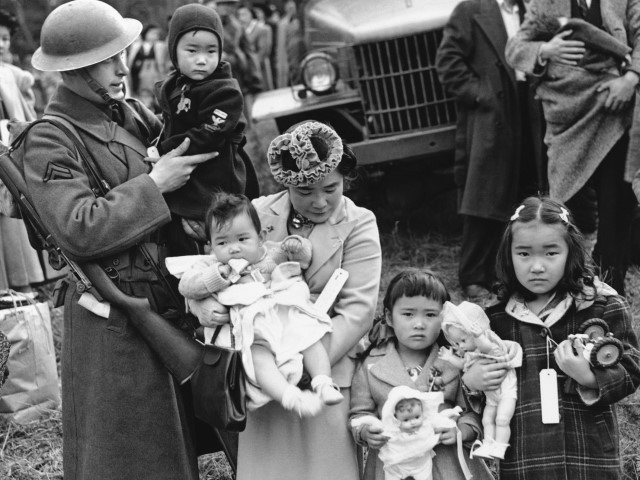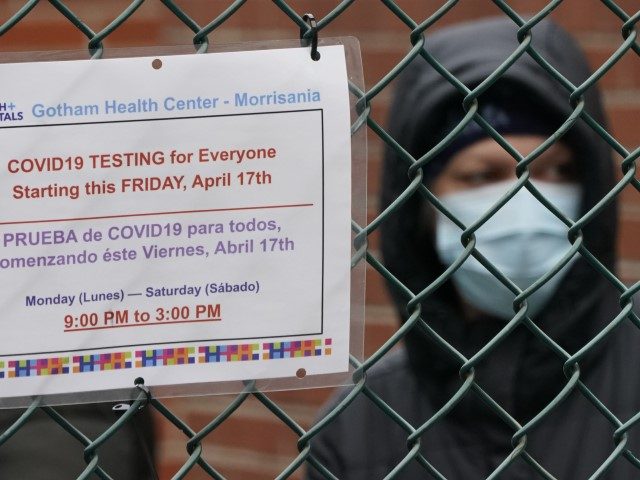Peter Schweizer and Eric Eggers — president and vice president of the Government Accountability Institute (GAI), respectively — reflected on the federal government’s internment of Japanese Americans following Japan’s attack of Pearl Harbor while discussing legislative measures proposed in New York to detain those the governor deemed “potentially dangerous to public health.”
Schweizer and Eggers examined government policies marketed as “public health” while guest-hosting Sean Hannity’s eponymous radio show on Monday.
New York state’s Assembly Bill A416 — legislation ostensibly proposed for purposes of “public health” — would empower the governor to detain any individual deemed “a threat to the public health.” The bill’s summary describes the legislation as “[relating] to the removal of cases, contacts and carriers of communicable diseases that are potentially dangerous to the public health.”
Schweizer described government power as “a blunt force instrument” while reflecting on Franklin D. Roosevelt’s internment of Japanese Americans. He said the White House sold its internment policy as protective of both Japanese Americans and Americans, more broadly.
“Let’s go back in history a little bit and talk about a comparison,” he stated. “It’s not a perfect comparison, but I think it’s a powerful one. … The United States was taken by surprise at Pearl Harbor,” he said. “It was a catastrophic intelligence failure by that administration. So … they said, ‘We are going to start interning in internment camps Japanese Americans,’ and the argument was, ‘We’re going to do this to protect Americans. We’re also going to do this to protect Japanese Americans.'”
Eggers replied, “It’s interesting to consider that parallels [sic]. Obviously COVID lockdowns and any policies related to COVID are not the same thing as an internment camp, but you had an event, people died, people were scared, the government went into action, and what they thought — and what all the smart people in the administration thought — was the right thing to do to protect people.”
Schweizer described abusive government decrees in the context of COVID-19 as an overcompensation following an initial failure. He warned of a trajectory and momentum towards further undermining fundamental rights.
He remarked, “What we’re seeing out of the New York State Assembly certainly is not the same as what Japanese Americans went through, but it’s moving in that direction, and it’s doubling down on taking away your civil liberties, because they failed to begin with, and they are now effectively trying to cover up their initial failing.”
Eggers linked proposals for centralized government databases of COVID-19 vaccination records to the federal government’s use of census data to detain Japanese Americans during World War II.

Mrs. Shigeho Kitamoto is evacuated along with other Japanese from Bainbridge Island in Washington State, March 30, 1942. Uncredited / ASSOCIATED PRESS
He said, “One of the bills that’s been proposed is this idea of forcing all adult vaccine records into a state database, and as history will tell you … one of the ways … in which they identified all Japanese Americans in the 1940s was through census data, and they were able to go and find individual census records and identify Japanese Americans to get them — for their own safety — into internment camps.”
“This is the stuff that kind of freaks people out,” he added, “and it should.”
Eggers observed the social conditioning of fearing other Americans produced by government policy and news media narratives. He and Schweizer recalled a recent anecdote in a New York City hotel elevator given their travel to the Big Apple to host the Sean Hannity Show.
He remarked, “People now get on a elevator with you in a hotel, and you can see in their eyes, there’s this flicker of danger, because the social contract has been inverted, and we now have been told to see other people as threats to our physical well-being.”
He added:
[Japanese Americans] fell into a category that was perceived to be not obedient or not in line with what the government’s mission or agenda was at that time. You’ve heard some people draw comparisons between the unvaccinated and people considered to be hostile, but I think that’s what’s dangerous about this duality, like you’re either in or you’re not.
This inversion of the social contract [is] where we are now being told to see other human beings — other Americans — [as threats]. I think we’re meant to live in community with each other and help each other, and why I have such a such a hard time with it is that we’re now told to see that you could be a threat, you could physically impact my well-being, and I should be afraid of you, and I just think that’s so backwards and dangerous and unhealthy.
Schweizer and Eggers are hosts of The Drill Down, a weekly podcast describing itself as committed to exposing “crony capitalism, misuse of taxpayer monies, and other government corruption or malfeasance.”

COMMENTS
Please let us know if you're having issues with commenting.